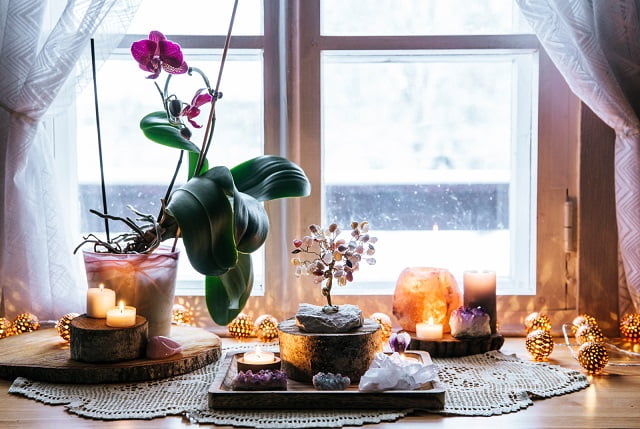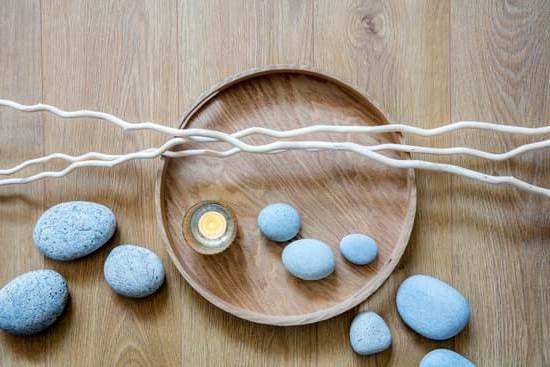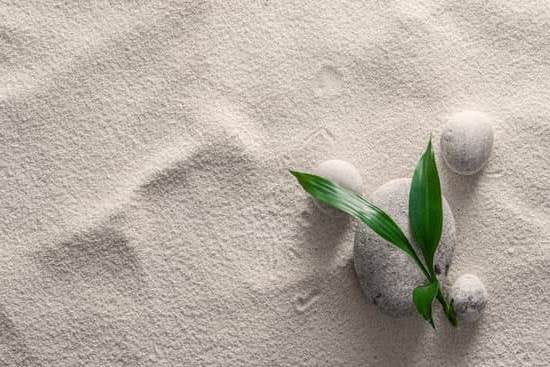
Feng Shui is an ancient Chinese philosophy often used to determine the best arrangement of a space in order to promote health and prosperity for the people inhabiting it. It dates back to 3,000 BC, where people believed that all things were connected through a force of energy – also known as ch’i or qi.
The key to good Feng Shui is to create harmony with the environment by using a combination of proper placement and alignments for items such as furniture and doorways, along with the use of materials like wood, stone, fire, and water.
It is thought that proper Feng Shui can increase personal well-being by creating an environment that helps generate positive energy in an area. For example, if your furniture is arranged in such a way that your eye-line runs directly into the door when you enter a room, this should signify that there’s plenty of open space around you which brings balance and fosters feelings of happiness and security.
On the other hand, if your living area tends to be cluttered with too many items or nobody ever sits facing the door when they enter – then this can easily lead to feelings of insecurity or chaos due to imbalance in flow.
Feng Shui for homes serves three main purposes: improving relationships within families – – harmonizing with nature so that its energy can be beneficial – – and creating an optimal living environment for its inhabitants.
To achieve these objectives, one must consider many aspects such as lighting levels throughout various rooms; plants; furniture layout; art displays; window coverings; water elements; strategic placing mirrors; door orientation/location; color palettes used inside each room; flooring designs selection etc It’s about finding balance between structure and organic design elements so everything works in harmony together.
Taking into account all these important factors would ensure that greater satisfaction and comfort are felt while living inside your home.
Reaping the Benefits of Feng Shui
Using Feng Shui principles in the home is not only about creating a sense of harmony, balance and wellbeing. It is also about enabling the release of stress, improving physical vitality, and positioning our homes so that positive energy can be attracted more easily.
To reap the psychological benefits of Feng Shui it’s important to remove any cluttering or objects associated with sadness or anger from the home. Keeping the bedroom uncluttered and having colors like blue and green representing water element helps to emit a calming effect on the psyche.
Any sharp edges should also be minimized, as these are associated with tension in East Asian culture. Practicing meditation can prove beneficial too; this tranquil ritual can invite insight into resolution of issues and replacing a feeling of uneasiness with an inner peace.
The emotional health associated with arranging a home according to Feng Shui principles can help create an atmosphere that invites clarity and creativity, while allowing emotions to be expressed out loud instead of suppressed within. Having artwork that represents joy around your living space will help remind you regularly of what truly matters in life – love, friendship, support system etc.
Furthermore it is essential for us to get plenty of fresh air as this allows us to think clearer inviting our mind to take control instead of suppressing it leadinging to better decision making abilities hence enabling improved emotional well-being.
The physical benefit from using Feng shui could include improved sleep patterns when we de-clutter our bedrooms by removing anything that does not belong in there (such as any electronics devices), such as cel phones or laptops which emits negative energy known as ‘sha qi’ according Chinese culture which leads to poor sleep quality or insomnia.
Placing plants inside our homes will encourage better air quality reducing allergies while having several different types of textures instantly reactivates tactile pleasure relieving stress and increasing overall alertness thus allowing us receive adequate physical wellness due use feng shui principles correctly inside the house.
Common Feng Shui Practices
Feng Shui is an ancient practice practiced in many parts of the world, most commonly in Asian cultures. It involves manipulating and arranging objects to optimize the flow of energy, or “chi”, throughout a space. One of the primary principles of Feng Shui is that our environment affects how we feel and it is believed that when implemented correctly at a home or other dwelling, it can bring positive energy and create balance within a space.
Some of the more traditional Feng Shui practices involve clearing any clutter or disruptive influences such as items that are broken and anything seen as negative like unsightly paint colors or outdated furniture. Releasing stale energy can allow for an invigorated feeling that helps to promote positivity. Furniture should be organized around the room and facing each other so conversation can flow freely, which aides in relationships and energy movement.
In addition to promoting clarity and releasing stagnant energy from spaces with physical objects, Feng Shui also uses sound enhancers as part of its practice such as music. Adding music to a space helps tone down any negative vibes as well as provides inspiration for creativity. Color choice also influences one’s energy levels; certain subtle hues promote calmness while brighter more vibrant shades evoke more enthusiasm.
Incorporating plants into homes adds life force inside while drawing upon nature’s abundance to help bring luck and good fortune into living spaces. Statues or pieces associated with deities add a spiritual dimension but must be placed carefully on altars in order to keep their presence respected in your home’s interior design layout.
Ultimately all Feng Shui practices emphasize restoring harmony between one’s internal environment through visualizing desired outcomes and positively transforming every aspect of life through optimizing chi inside an abode.
Feng Shui and Color
Feng shui is an ancient Chinese art that focuses on how energy, or qi, flows around a given space. As such, it is important to consider when decorating a home and choosing elements such as color. Colors play an important role in setting the overall energy of the home environment, which can have a strong influence on our lives and moods.
When designing your home with Feng Shui, using the right colors is essential to encourage the positive flow of energy. Color choice typically depends on the area you are working in and what type of energy you wish to promote.
For example, in areas where relationships are important and need support, warm colors like red and pink would be best for creating an atmosphere of love and acceptance. Alternatively, in areas used for studying or work where focus is needed, blues or greens could be used to create a calming environment that encourages productivity.
In general terms the five Feng Shui element colours should also be used when choosing paint and decoration for your home. The five elements are wood (green), fire (red), earth (yellows & browns), metal (white & grey) & water (blues). Depending upon the sector these colours can bring good fortune if placed correctly.
For example green commands near Wooden hills and mountains while red brings fame and recognition in The South sector of a building while blues are recommended in sectors represented by water – North East being one of them. It pays to take note of element interaction within each sector of your house before painting it so that you don’t contradict unlucky combinations referenced within certain Traditional feng shui systems such as Eight Mansions or Flying Star feng shui methodologies
Ultimately Feng Shui is about getting balance between energies – so it will be necessary to consider all these options when trying to get harmony between architecture’ colour choices & natural features taking into account any geomancy remedies – so that you can make sure your home not only looks beautiful but offers abundance & protection from potential Invaders.
Creating the Best Layout
Feng Shui is an ancient Chinese practice that has been used for centuries to promote good energy flow within a home. According to this philosophy, the arrangement of furniture in a home can have a significant impact on how positive or negative energy flows throughout the space. When it comes to setting up your furniture layout for a successful Feng Shui home, there are numerous options available.
A popular approach is the Bagua Map method. This involves dividing the space into eight sections and matching certain items of furniture with each area with regards to its purpose and the associated elements. For example, the career area of the Bagua Map is located near the entrance of your home and may be appointed with items such as laptops, bookshelves, or even plants that represent growth and opportunity.
Other important furniture arrangements in Feng Shui include cleansing clutter which is believed to block energy flow. De-cluttering helps create an organized environment which generates positivity while removing chaos and disorganization from your living space. Additionally, focusing on brightening living areas by creating open spaces without large obstructions will create an airy environment that encourages positive energy flow by allowing chi or Qi (positive energy) to move freely throughout the space animating it with good luck.
Finally, it’s beneficial to think about how you want each room in your house to feel since organically placed furnishings according to activities related to fun and productivity should be respected in order for everyone who visits your home experiencing abundance flow within a relaxed atmosphere full of joy and harmonious goodness.
Achieving the Right Balance
Feng shui is all about achieving a feeling of harmony in the home, and one way to do this is by incorporating the principles of Yin and Yang. Yin and Yang represent complementary energies, balancing each other out. This balance can be achieved in many ways, from the way that furniture is arranged within the room to ensuring that there are a good mix of textures and colours within the house.
One way to incorporate these two energies into a home is by arranging furniture with an equal balance between light and dark fabrics or woods. If all of the furniture is light-coloured wood, it can create an overly bright atmosphere, overpowering with its ‘Yang energy’. Instead, by introducing some darker tones it can create more balance in the room and will temper any overly strong energy in the area.
Textures are also important when creating harmony between Yin and Yang energies in a property. Creating visual interest through mixing hard surfaces such as tiles or wood floors with softer materials such as rugs or fur throws will bring more balance while also adding warmth to spaces.
Introducing gentle lighting from lamps or candles will help break up harsher overhead lighting as well as providing focus on specific areas of the space to create restful spots for relaxation or entertaining purposes.
By focusing on finding a balance between Yin and Yang whilst arranging furniture and accessories within your property, you can easily create calm yet inviting ambience throughout your home – perfect for winding down after even the most stressful day.
Dealing With Clutter
When trying to improve the feng shui in a home, starting with clearing out clutter should always be the first step. Clutter accumulates over time and can start to feel overwhelming and make a living space feel cramped and uncomfortable.
One of the best ways to deal with clutter is by setting aside an entire day to thoroughly go through each room in the house. Start by reorganizing furniture and cleaning up misplaced items, then it’s time to get into the specific tasks.
Create three separate piles: keep, donate/sell and throw away. Put every item in its relevant pile after inspecting it closely.
Maybe there are some items that could easily be moved to different rooms or parts of your house; doing this will also allow you to re-arrange furniture without accumulating more stuff. If donating/selling is not an option, consider throwing it out instead of simply keeping all clutter around the house, as this will only make the problem worse in the long run.
Lastly, figure out a system for storing needed items away so that they don’t accumulate again in any particular area or room. Investing in shelves or drawers specifically designed for these kinds of items can help immensely when trying to stay organized.
An example would be purchasing several plastic drawer units to store frequently used objects such as office supplies, kitchen ware or even clothing. Creating better organizational habits can lead to having much less clutter which contributes greatly towards having a tranquil home environment full of positive energy according to feng shui principles.
Further Tips and Advice
Feng Shui practitioners have many centuries of knowledge and wisdom when it comes to helping us achieve balance and harmony in our lives. The consulting element of Feng Shui offers clients an opportunity to identify and remedy any imbalances or problems occurring in their energy field, which can ultimately lead to blocks in creativity or abundance.
Using a qualified expert to help tailor your perfect home environment will also significantly increase the success rate for positive outcomes on all aspects of life, from career opportunities to romantic relationships.
At the start of a consultation, the practitioner will begin by evaluating the current layout and objects that make up your home environment. Many practitioners use simple diagrams like Bagua maps as descriptors for locations within the house and will commence with assessing what needs adjustment based on understanding elemental effects on each one.
For example, the kitchen would contain predominantly fire elements due to its relationship with cooking, whereas bathrooms may be associated with water elements because they are places in which we cleanse ourselves. With this holistic approach – considering an individual’s personal goals and objectives – these consultants aim to provide customised advice whenever possible.
In addition to interior changes that make a substantial difference in terms of energy flow, one should consider decluttering and reorganising furniture wherever necessary. This includes moving out items that no longer serve your true purpose and replacing them with more useful items, such as plants and artwork that promote goodwill within your home.
Finally, implementing minor improvements such as introducing new color schemes throughout living areas or adding small decorations for accents can create an aura of harmony as well show off personal style statements without appearing too ‘in-your-face’ about our households’ look and feel. Experts suggest that these small changes might just be enough bit bring big change into our Feng Shui adjustments.
When aiming towards achieving higher levels of inner balance through Feng Shui in the home setting – having an experienced consultant at your side is optimal for success. Taking into account both internal factors (such as intentions) as well external factors (such as physical adjustments), one can truly transform a sterile environment into their dream sanctuary where everything seems possible. With time working against you, finding a Feng Shui specialist could be right answer you’re looking for.




